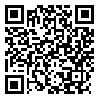Volume 27, Issue 3 (5-2020)
RJMS 2020, 27(3): 85-92 |
Back to browse issues page
Research code: 18121402962001
Ethics code: 18121402962001
Download citation:
BibTeX | RIS | EndNote | Medlars | ProCite | Reference Manager | RefWorks
Send citation to:



BibTeX | RIS | EndNote | Medlars | ProCite | Reference Manager | RefWorks
Send citation to:
Tashakori S, Khorshidi D. Effect of short-term ginseng supplementation on some markers of intense anaerobic exercise- induced cell damage in active young girls. RJMS 2020; 27 (3) :85-92
URL: http://rjms.iums.ac.ir/article-1-6114-en.html
URL: http://rjms.iums.ac.ir/article-1-6114-en.html
1- Islamic Azad University, saveh-Islamic Azad University, Saveh Branch , khorshididavood@yahoo.com
Abstract: (3163 Views)
Background: The intense and exhaustive exercise causes oxidative stress and cell damage. The purpose of this study was to investigate the effect of short-term ginseng supplementation on biochemical markers of cell damage following intense anaerobic exercise.
Methods: In this semi-experimental study, 20 active girl students with the mean age of 22.85±3.7 years were randomly divided into experimental (n=10) and control (n=10) groups. Subjects of the experimental and control groups respectively received two capsules of ginseng (1036 mg) or placebo daily for seven days. All subjects participated in an intense anaerobic exercise test (Rast) after supplementation period. Lactate, lactate dehydrogenase and aspartate aminotransferase levels were measured in three phases; baseline, after supplementation and immediately after anaerobic exercise test. Data were analyzed by repeated measure ANOVA.
Results: Lactate, lactate dehydrogenase and aspartate aminotransferase levels significantly increased after the exercise test in the two groups (p˂0.05). However, there were no significant differences in levels of Lactate p=0.35), lactate dehydrogenase (p=0.14) and aspartate aminotransferase (p=0.47) between experimental and control groups following exercise test.
Conclusion: Based on the findings of this study, it can be concluded that short-term ginseng supplementation has no effect on biochemical markers of cell damage following intense anaerobic exercise.
Methods: In this semi-experimental study, 20 active girl students with the mean age of 22.85±3.7 years were randomly divided into experimental (n=10) and control (n=10) groups. Subjects of the experimental and control groups respectively received two capsules of ginseng (1036 mg) or placebo daily for seven days. All subjects participated in an intense anaerobic exercise test (Rast) after supplementation period. Lactate, lactate dehydrogenase and aspartate aminotransferase levels were measured in three phases; baseline, after supplementation and immediately after anaerobic exercise test. Data were analyzed by repeated measure ANOVA.
Results: Lactate, lactate dehydrogenase and aspartate aminotransferase levels significantly increased after the exercise test in the two groups (p˂0.05). However, there were no significant differences in levels of Lactate p=0.35), lactate dehydrogenase (p=0.14) and aspartate aminotransferase (p=0.47) between experimental and control groups following exercise test.
Conclusion: Based on the findings of this study, it can be concluded that short-term ginseng supplementation has no effect on biochemical markers of cell damage following intense anaerobic exercise.
Type of Study: Research |
Subject:
Exercise Physiology
Send email to the article author






